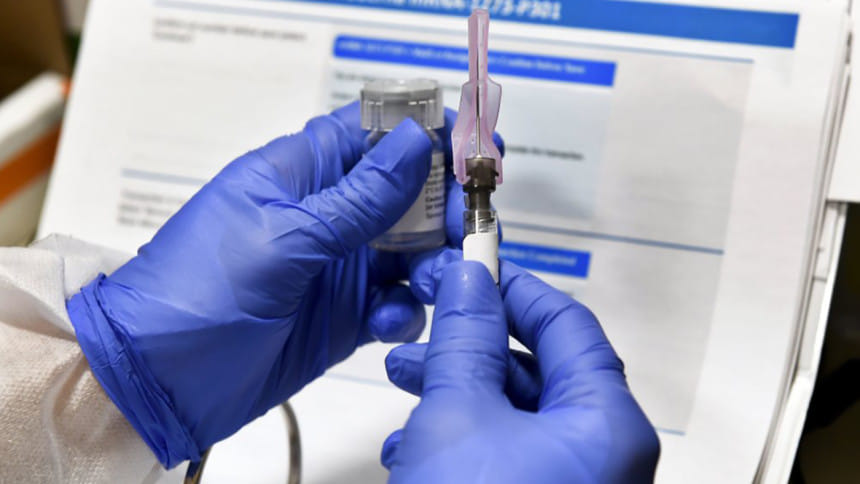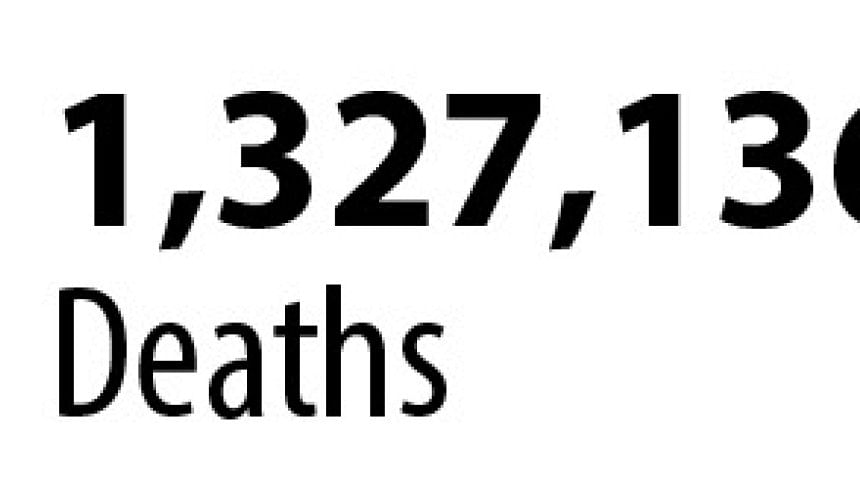Moderna vaccine gives more hope

Moderna Inc's experimental vaccine was 94.5 percent effective in preventing Covid-19 based on interim data from a late-stage trial, the company said yesterday, becoming the second US drugmaker to report results that far exceed expectations.
Together with Pfizer Inc's vaccine, which is also more than 90 percent effective, and pending more safety data and regulatory review, the United States could have two vaccines authorized for emergency use in December with as many as 60 million doses of vaccine available this year.
Next year, the US government could have access to more than 1 billion doses just from the two vaccine makers, more than needed for the country's 330 million residents.
The vaccines, both developed with new technology known as messenger RNA (mRNA), represent powerful tools to fight a pandemic that has infected 54 million people worldwide and killed 1.3 million.
The news also comes at a time when Covid-19 cases are soaring, hitting new records in the United States and pushing some European countries back into lockdowns.
"We are going to have a vaccine that can stop Covid-19," Moderna President Stephen Hoge said in a telephone interview.
Moderna's interim analysis was based on 95 infections among trial participants who received either a placebo or the vaccine. Of those, only five infections occurred in those who received the vaccine, which is administered in two shots 28 days apart.
"Having more than one source of an effective vaccine will increase the global supply and, with luck, help us all to get back to something like normal sometime in 2021," said Eleanor Riley, professor of immunology and infectious disease at the University of Edinburgh.
Moderna expects to have enough safety data required for US authorization in the next week or so and the company expects to file for emergency use authorization (EUA) in the coming weeks.
A key advantage of Moderna's vaccine is that it does not need ultra-cold storage like Pfizer's, making it easier to distribute. Moderna expects it to be stable at normal fridge temperatures of 2 to 8 degrees Celsius (36 to 48°F) for 30 days and it can be stored for up to 6 months at -20C.
Pfizer's vaccine must be shipped and stored at -70C, the sort of temperature typical of an Antarctic winter. It can be stored for up to five days at standard refrigerator temperatures or for up to 15 days in a thermal shipping box.
Another drugmaker Sanofi also said their vaccine also won't need to be super-cooled.
"Our vaccine will be like the 'flu vaccine, you can keep it in your refrigerator," the Paris-based drugmaker's France chief Olivier Bogillot told the CNews channel. "This will be an advantage for some countries," he added.
The Sanofi vaccine, one of many in development, will be available for distribution next June, Bogillot added.
While the breakthroughs open a chink of light at the end of the tunnel, experts caution there are still difficult and dangerous months ahead.
"A vaccine on its own will not end the pandemic," warned World Health Organization head Tedros Adhanom Ghebreyesus.
Supply will initially be limited to health care workers and other vulnerable populations, which could offer major help to hospital systems but will "still leave the virus with a lot of room to move," he said.
The data from Moderna's trial involving 30,000 volunteers also showed the vaccine prevented cases of severe Covid-19, a question that still remains with the Pfizer vaccine. Of the 95 cases in Moderna's trial, 11 were severe and all 11 occurred among volunteers who got the placebo.
Moderna, part of the US government's Operation Warp Speed program, expects to produce about 20 million doses for the United States this year, millions of which the company has already made and is ready to ship if it gets FDA authorization.
The 95 cases of Covid-19 included several key groups who are at increased risk for severe disease, including 15 cases in adults aged 65 and older and 20 in participants from racially diverse groups.
"We will need much more data and a full report or publication to see if the benefit is consistent across all groups, notably the elderly, but this is definitely encouraging progress, said Stephen Evans, professor of pharmacoepidemiology, London School of Hygiene & Tropical Medicine.
One unknown with this vaccine, and all the others currently being tested, is whether they will stop Covid-19 spreading.
"It is likely that vaccines that prevent symptomatic disease will reduce the duration and level of infectiousness, and thus reduce transmission, but we don't yet know if this effect will be large enough to make any meaningful difference to the spread of the virus within communities," said Riley at Edinburgh University.
Moderna's data provide further validation of the promising but previously unproven mRNA platform, which turns the human body into a vaccine factory by coaxing cells to make certain virus proteins that the immune system sees as a threat and mounts a response against.
The United States has the world's highest known number of COVID-19 cases and deaths with more than 11 million infections and nearly 250,000 deaths.
The Trump Administration has primarily relied on the development of vaccines and treatments as its response to the pandemic. Moderna has received nearly $1 billion in research and development funding from the US government and has a $1.5 billion deal for 100 million doses. The US government also has an option for another 400 million doses.
The company hopes to produce between 500 million and 1 billion doses in 2021, split between its US and international manufacturing sites, dependent in part on demand.
Moderna also said it would use its data to seek authorization in Europe and other regions.
Europe's health regulator yesterday said it had launched a real-time "rolling review" of Moderna's vaccine, following similar reviews of vaccines from Pfizer and AstraZeneca.
Other countries such as China and Russia have already begun vaccinations. Russia licensed its Sputnik-V Covid-19 vaccine for domestic use in August before it released data from large-scale trials. It said on Nov 11 that its vaccine was 92% effective based on 20 infections in its large trial.


 For all latest news, follow The Daily Star's Google News channel.
For all latest news, follow The Daily Star's Google News channel. 



Comments